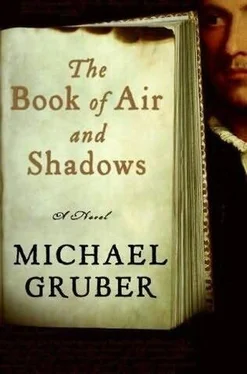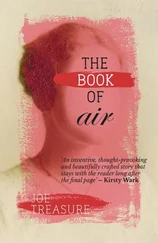This had a sobering effect on Mary Peg, but only for a while, and it took all of Crosetti’s jollying skills and Klim’s as well, to bring her back into countenance. The children helped here. Crosetti stayed for supper, which was spaghetti and meatballs (and had been Spg & MB many, many times in the past week, confided Klim), and he marveled at the way a grandparentish milieu had been created from scratch out of what amounted to happenstance. It was the sort of thing that happened all the time in Dickens, Crosetti knew, but he had not looked for it in modern New York. Or perhaps, he thought later, all times were the same, the urge to form families always bubbling up from beneath the surface crud of selfishness. Mary Peg apparently had vast reserves of grandmaternal energies untapped as yet by her natural progeny, all still childless; and Klim had transformed himself into a granddad out of fairy tales: what stories he told, with funny faces, what clever carving of whistles and little toys, what horsey rides, what silly songs he knew, all with pokes and tickles involved! The children, especially the little girl, Molly, had blossomed under this treatment, as children do. They all believe implicitly in magic and think nothing of being carried away from the ogre’s castle to the land of the good fairies.
And Crosetti was happy for them all, but he did feel somewhat extra now, as if this development had confirmed his instinct that his time in his mother’s home was quite over. Besides, there was no room. Besides, it made him uncomfortable to see Rolly staring out at him from her children’s faces. He packed his things, hired a U-Haul trailer for the family car to pull, and was out by the following evening with, however, a check for ten grand from Mishkin that had arrived that morning in a FedEx envelope. No one insisted that he stay.
He was unpacking cartons to music in his new shared loft when he felt his phone vibrating in his pocket. He unplugged his earbuds and put the phone to his cheek.
“Write this down. I have thirty seconds.”
“Carolyn?”
“Write this down. Oh, Christ, you have to help me!” And there followed an address and directions to a lakeside house in the Adirondacks. Crosetti pulled out a ballpoint and scribbled the information on the underside of his left forearm.
“Carolyn, where are you? What the hell is going on?”
“Just come and don’t dial this number. They’re going to kill-” with the rest of the sentence lost in static.
Not good, Crosetti thought, a cliché in fact, especially that business with the call cutting out. The film was going to end on a downer note, bittersweet, tracking the hero returning to his work, maybe the hint of a relationship with the kids, life goes on, or maybe even a hint that Rolly is still alive, a teaser: but not this banal…and he actually kept thinking this way for minutes, stacking books on raw pine shelving, before the reality of the call sank in. Sweat popped out on his face and he had to sit down on the dusty, sprung easy chair he’d scavenged off the street. She really is going to drive me crazy, he thought; no, make that past tense. Okay, I’m game, he thought, I’m an international man of mystery too. What do I need? The Smith & Wesson was back at his mother’s house, and no way was he going back there and explain why he needed it, and now that he thought about actually handling the thing again…no, thanks. But he had hiking boots, check. Richard Widmark black seaman’s sweater, check. Ball cap? No, the watch cap, much better, and the Swiss Army knife, and the grenade launcher…no, just kidding, and the trusty black slicker, still with the mud of Old England on it, wallet, keys, oh, binoculars, can’t forget those, and boy, I’m about as ready as I’ll ever be to face God knows how many heavily armed Russian mobsters…
“Come again?”
It was Beck, one of the roommates, looking at him from the doorway with a peculiar expression. Beck was a cadaverous being who worked as a sound engineer and wrote reviews of films no one but him had ever seen, or perhaps did not yet exist.
“I didn’t say anything,” said Crosetti.
“Yeah, you were talking, loud, like you were pissed off. I thought you had someone in there with you and then I remembered you came in alone.”
“Oh, then I was talking to myself. I’m having a psychotic break is all.”
“Fuck, man, join the club. If you need a lobotomy I could start sharpening the screwdriver.”
“It’s a girl,” Crosetti admitted. “A girl has driven me crazy. She dumped me and now she wants me to rescue her. This is the second time for the dump ’n’ rescue motif.”
“Whatever. I tend to stick to the gospel according to St. Nelson Algren: never fuck anyone with more problems than you have yourself. Of course, he fucked Simone de Beauvoir…”
“Thank you. I’ll remember that in my next life. Meanwhile, a man’s gotta do what a man’s gotta do. Can I borrow your computer? I need some maps.”
It took himthe usual forty-five minutes to clear the city but on the thruway past the Tappan Zee he made up for lost time. The old Fury had been maintained in perfect trim: inside was a 440-cubic-inch V-8 engine and outside was waxed midnight blue lacquer, plus the various shields and decals that police officers use to identify themselves to other police officers so as to render their cars virtually immune to any ticketing, whether rolling or parked. Crosetti cranked it up to ninety and made it to Albany in a little over two hours. Another ninety miles and seventy minutes got him to Pottersville, where he filled his tank and ate a horrible gas station microwave meal, by which time it was dark and snowing, fat floaters that seemed the size of golf balls when they hit the glass, although it was still too warm for the snow to stick to the asphalt of the highway and he did not slow down. Crosetti was deep in the blankness of the freeway dream, on autopilot, his brain running with plots of movies, odd facts, straining for coherent memories of trivial life occurrences, including especially his pathetically brief skein of days in the company of Carolyn Rolly.
State Route 2, which he turned onto fifteen minutes later, was a narrow tunnel of headlight through a shake-up snow-globe toy; after the zoom of the thruway, Crosetti felt like he was parked. He drove for what seemed like an impossibly long interval and at last a few lights shone ahead, which was New Weimar, two gas stations, some tourist traps, a scatter of houses, and then the search for the sign that marked the gravel road to Lake Henry. He missed it once and had to slew the car around on the snowy road and backtrack until he found the thing, bent over at an angle and full of bullet holes. Thus did the armed locals take out their class rage on the rich people who owned the lake.
An even narrower tunnel now and here the snow was sticking well, making the car fishtail on the hills. Time slowed; he lost track of its passage. The Fury boasted only an old-fashioned AM radio, which, for the last dozen miles or so, had produced only static-filled country music. He switched it off. Now only the hiss of the wipers, the competent purr of the great engine. A flash of yellow ahead a double arrow, the road ending in a T. He switched on the dome light and read his maps. A right turn then, and shortly there appeared a cluster of mailboxes, thick with the wet snow, and a white-clotted driveway. He pulled the car forward a dozen yards, took a four-cell flashlight from the glove compartment, and started down the drive. It was a little after three in the morning.
And here was the house, a substantial country lodge made of stripped logs, with a sharply peaked roof and a wide veranda running along three sides. A thin light spread from the front windows and made a yellowish patch on the new snow. As Crosetti walked around the house he felt, rather than saw, the presence of the lake, absolute blackness where the snow ended, with a thin white finger pointing into it, the dock.
Читать дальше












